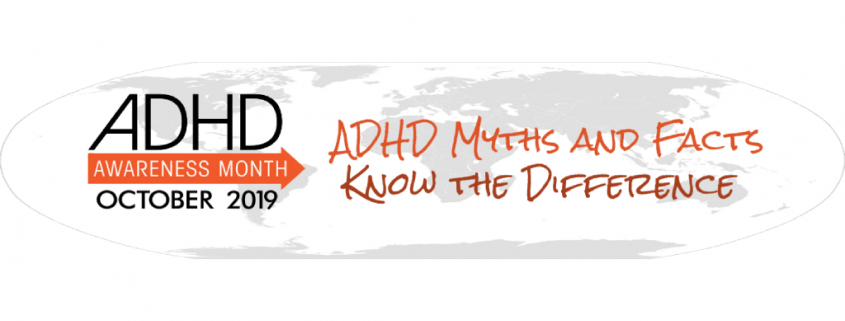ADHD Month: Myths Versus Facts! Myth #1
Myth: ADHD doesn’t Exist but research and science has F A C T:
Adapted from the full length article by Russell A. Barkley, Ph.D.
Virginia Commonwealth University Medical Centre
We periodically hear that ADHD is a myth. Nothing could be further from the truth. There are more than 100,000 articles in science journals on ADHD (and its precursor labels) and references to it appear in medical textbooks going back to 1775.
Jerome Wakefield, Ph.D. defined explicit criteria for judging mental disorders more than 20 years ago.
Real disorders:
- consist of a failure or serious deficiency in the functioning of a mental ability and
- this failure or deficiency is producing harm to the individual. We can show that ADHD meets both these standards.
First: there is overwhelming evidence ADHD involves a serious deficiency in both attention (poor sustained attention and distractibility) and behavioural inhibition (impulsivity and hyperactivity). These symptoms of ADHD actually reflect an underlying problem in the development of executive functioning (EF). The prefrontal lobe network, or executive brain, provides executive mental abilities necessary for goal-directed, future-oriented action: self-awareness, inhibition, working memory, emotional self-regulation, self-motivation, and planning/problem-solving. These mental abilities give us self-regulation, and ADHD symptoms arise from deficiencies in them.
Whether you think ADHD is a disorder of EF or see ADHD as a disorder of inattention and inhibition, the evidence supports a failure or serious deficiency in the functioning of a set of mental mechanisms. Criterion number 1 has been met.
Is ADHD associated with harm to the individual?
Harm refers to an increased risk of mortality (death), morbidity (injury), personal suffering (a markedly reduced quality of life), or impairment in major domains of life activities essential to our survival and welfare. ADHD is linked to a nearly doubled risk of early mortality before age 10, and more than 4 times the risk of early death in adults before age 45. People with ADHD have 3-5 times the risk for accidental injury, and a higher risk for repeated injuries, visitation to the hospital emergency room, and hospitalisation.
Abundant research shows people with ADHD function ineffectively in myriad major life activities that result in impairment and adverse consequences. There are few outpatient mental disorders more severely impairing, impairing to more people, and across more domains of major life activities than ADHD. As you can see, ADHD handily meets both standards for being a valid mental disorder. Thus ADHD is real.
Sometimes critics claim ADHD cannot be real because there is no objective laboratory test for the disorder. The absence of a test hardly means the absence of a disorder. Disorders are primarily discovered first by describing the symptoms that are believed to comprise that condition and showing they cluster together routinely. Then scientists search for the causes that contribute to those symptoms. Only then, years or even decades later, when evidence is well established is clinical science able to discover some objective means of routinely testing for it.
To download the full article click here.
ABOUT THE AUTHOR
 Russell A. Barkley, Ph.D. is a clinical scientist, educator, and practitioner who has published 23 books, rating scales, more than 290 scientific articles and book chapters related to the nature, assessment, and treatment of ADHD and related disorders, and clinical manuals numbering 41 editions. He is a Clinical Professor of Psychiatry at the Virginia Treatment Center for Children and Virginia Commonwealth University Medical Center, Richmond, VA. His websites are www.russellbarkley.org and ADHDLectures.com.
Russell A. Barkley, Ph.D. is a clinical scientist, educator, and practitioner who has published 23 books, rating scales, more than 290 scientific articles and book chapters related to the nature, assessment, and treatment of ADHD and related disorders, and clinical manuals numbering 41 editions. He is a Clinical Professor of Psychiatry at the Virginia Treatment Center for Children and Virginia Commonwealth University Medical Center, Richmond, VA. His websites are www.russellbarkley.org and ADHDLectures.com.



